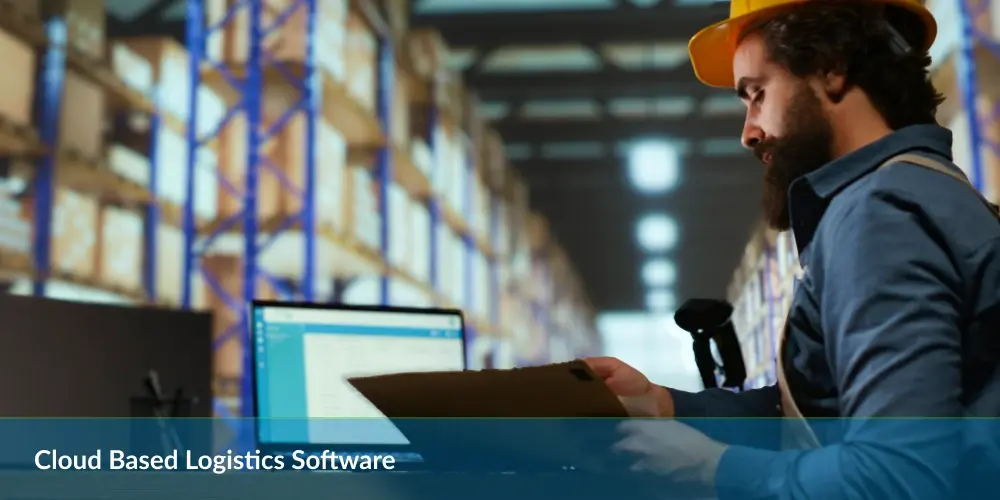Table of Contents
Logistics software serves as the central nervous system for supply chain operations, streamlining the complex processes involved in the movement and storage of goods. For small and medium-sized businesses (SMBs), instant access to such sophistication can mean the difference between surviving and thriving in a competitive marketplace.
Cloud-based solutions have emerged as pivotal tools in modern logistics management. They offer scalability, real-time data accessibility, and cost-effectiveness. These systems, particularly cloud logistics software, enable businesses to coordinate and control product flow with unprecedented agility. This technology empowers organizations to streamline operations, enhance supply chain visibility, and make data-driven decisions.
Redefining Efficiency: Overview of Cloud-Based Logistics Software
Cloud-based logistics software represents a transformative approach to managing supply chain operations. Unlike traditional logistics solutions typically installed on-premises, cloud-based logistics software is hosted on servers accessible over the Internet, enabling remote data storage, processing, and retrieval. This software offering is also known as Software as a Service (SaaS) within the logistics domain.
Businesses are increasingly transitioning from conventional systems to cloud-based platforms to harness enhanced cooperation, reduced total cost of ownership, and instantaneous updates characteristic of such systems. One begins by distinguishing between the platform and the Software to grasp cloud logistics. The platform represents the fundamental infrastructure that delivers the service via the Internet. Meanwhile, the Software is the suite of programs or applications that ride on that platform, giving users specific functionalities for logistics operations.
- Defining Cloud-Based Logistics Software: This innovation provides comprehensive logistics and supply chain management capabilities over the Internet, bypassing the need for internal hardware and maintenance resources.
- The shift from traditional to cloud-based logistics: This progression sees a movement towards on-demand, flexible resource provision that enables efficiency and can adapt to a business’s fluctuating needs.
- Platform and Software: understanding the basics: This involves grasping the modular nature of cloud-based services where the platform provides the environment, and the Software delivers tailored logistical functionalities.
Transforming SMB Operations: Cloud-Based Logistic Systems
Cost-Effectiveness and Scalability
Small and medium-sized businesses (SMBs) experience substantial reductions in upfront costs by adopting cloud-based logistics solutions instead of investing in physical infrastructure. Cloud logistics platforms operate on a subscription model, eliminating the need for capital expenditure on hardware. The pay-as-you-go nature allows for superb budget flexibility.
As businesses evolve, the need to scale operations becomes paramount. Cloud logistics software can seamlessly scale up or down based on demand, furnishing SMBs with the agility to adapt to market shifts without substantial investment in new resources or lengthy implementations.
Real-Time Inventory and Shipment Tracking
SMBs gain unprecedented visibility into their supply chain with cloud-based tools that provide real-time inventory and shipment tracking. Integrated features afford businesses the prowess to monitor inventory levels and track shipments across multiple channels and transportation modes.
Large enterprises can now manage shipments accurately and efficiently. Cloud logistics empowers SMBs to forecast inventory needs precisely, optimize stock levels, and ensure timely deliveries, thus fostering a robust logistics operation.
Improved Customer Service Capabilities
Utilizing real-time data through cloud logistics elevates customer service quality. Businesses can proactively address potential delivery issues, predict customer demands, and personalize interactions based on accurate and current information.
With the capability to tailor customer experiences, SMBs can cultivate satisfaction loyalty and enhance their competitive edge. Real-time data flow ensures that customer service representatives have all necessary information at their fingertips, ready to exceed customer expectations with speed and personalization.
Streamline Operations with Cloud-Based Logistics Integration
Businesses seeking enhanced efficiency often find integrating cloud-based logistics software with their existing infrastructure critical. This synergy enables leveraging current technological assets while laying the groundwork for advanced logistics capabilities. Rather than replacing existing systems in their entirety, cloud solutions can complement and extend their functionality.
Seamlessly Connecting with Current Business Systems
Cloud-based logistics software is designed for interoperability, facilitating a smooth connection with the diverse array of software applications and databases that businesses currently operate. This includes Enterprise Resource Planning (ERP) systems, Customer Relationship Management (CRM) tools, and various databases that handle inventory, shipments, and customer data. Streamlined data flow between systems ensures that business operations continue unabated, with improved information accuracy and resource management.
Minimizing Disruption During Transition to Cloud Solutions
Adopting new technologies often raises concerns about potential disruptions. However, a strategic approach to implementing cloud logistics software mitigates this risk. Developers and service providers offer specialized migration tools and services to minimize downtime. Complete data migration and system testing are conducted before full-scale launch to ensure meeting compatibility and performance standards. In addition, robust training programs equip employees with the necessary knowledge and skills to use the new system effectively from day one.
Automation of Supply Vietnam Processes
In the global commerce landscape, streamlining operations remains paramount for business success. Automating supply chain processes through cloud-based logistics software represents a significant leap in how companies in Vietnam manage their logistics. By leveraging automation, businesses reduce the need for manual intervention in repetitive tasks, directly influencing efficiency and the bottom line.
Reducing Manual Tasks with Automation Features
Vietnamese companies can automatically generate documentation, track shipments, and manage inventory using cloud-based logistics software. This reduction in manual tasks minimizes errors and frees up valuable human resources to focus on more strategic initiatives that drive business growth.
Enhancing Workflow and Increasing Productivity
Automated workflows spawn more than just task efficiency; they enhance productivity. The Software’s ability to coordinate and optimize various logistics functions translates into a smoother, more productive supply chain. Staff members are thus empowered to handle complex processes with greater precision and speed, ensuring that operational throughput in Vietnam’s competitive environment keeps pace with demand.
- Workflows become streamlined, allowing employees to address higher-order business challenges.
- Productivity gains are noticed across all levels, from warehouse staff to top management.
- Increased efficiency leads to better management of time-sensitive tasks such as order fulfillment and delivery scheduling.
Pro Tip: Ensure seamless integration by prioritizing interoperability with existing systems, utilizing specialized migration tools, and implementing robust employee training programs.
Data Analysis and Reporting Features for Data-Driven Decisions
Data drives the modern logistics industry, furnishing businesses with the insights necessary to refine operations. Cloud-based logistics software offers robust data analysis and reporting capabilities, allowing users to manipulate and understand copious amounts of logistics information in real time.
Utilizing Data for Insightful Business Decisions
With the advent of comprehensive dashboards, logistics managers effortlessly monitor key performance indicators (KPIs). These dashboards transform raw data into actionable insights, enabling informed decision-making. Drilling down into specifics, users may discern patterns, predict trends, and identify inefficiencies at a glance.
Tailored Reports to Assess Logistics Performance
Customization plays a pivotal role in report generation within cloud-based logistics platforms. Users craft reports tailored to specific business goals, including detailed analyses of shipping times, cost per delivery, or carrier performance. Advanced filtering, sorting, and visualization tools in these platforms facilitate the creation of customized reports that stakeholders can leverage for strategic planning and operational optimization.
- Businesses frequently adjust inventory levels based on insights from data trends, optimizing their stock to meet demand without incurring excess holding costs.
- Route optimization is another area where tailored reports actively contribute to efficiency improvements, highlighting opportunities to reduce fuel consumption and delivery times.
By scrutinizing every aspect of the logistics chain, these software solutions empower businesses with knowledge, directly translating into enhanced logistical performance.
Cost-Effectiveness and Scalability: The Foundation of Modern SMB Growth
Companies leveraging cloud-based logistics software unlock the advantage of reduced overhead costs. Small to medium-sized businesses (SMBs) can allocate financial resources more efficiently by forgoing the need for extensive on-premise infrastructure. Subscription-based models typical of cloud services enable precise budget alignment with needs and usage, effectively removing the barrier of entry for advanced logistical solutions.
Adopting an Affordable Framework for Logistics Management
SMBs experience direct cost savings through the minimized expense of hardware, software licenses, and IT maintenance associated with traditional systems. Cloud software provides a pay-as-you-go structure, ensuring businesses only pay for the capacity and features they use. This model inherently supports a lean approach to budgeting, providing an agile financial framework that is particularly advantageous for SMBs with variable demand patterns.
Aligning Scalability with Business Objectives
Scalability constitutes a strategic component within the logistics domain, where demand fluctuations require a responsive approach. Cloud solutions offer seamless scalability, allowing businesses to quickly adjust service levels and capabilities in response to market dynamics. Businesses can proactively plan scalability by analyzing anticipated growth and aligning it with the flexibility cloud logistics providers offer. Adding or reducing capacity becomes a straightforward process, which, in turn, aids in maintaining competitive edge and customer satisfaction.
- Business expansion or contraction can occur without significant system reconfiguration.
- Operational agility is achieved, allowing launch or decommission services in line with real-time logistical demands.
- Businesses can explore new markets or adjust to seasonal spikes without the constraints of fixed asset investments.
Scalability through cloud logistics supports growth prospects and protects against unpredictable market currents. Companies stay equipped to handle fluctuations without capital-intensive infrastructure adjustments. The modular nature of these solutions promotes continuous improvement in logistical operations, anchoring SMBs’ growth trajectory in cost-effective, adaptable technology.
Mastering Logistics with Real-Time Inventory and Shipment Tracking
Real-time inventory and shipment tracking transforms logistics management by providing instantaneous data on the whereabouts and status of stock and shipments. Recognized for enhancing transparency, this dynamic capability streamlines business operations of all sizes.
Enhanced Shipment Management through Tracking
Tracking systems operate on granular data, offering precise shipment locations. Logistics teams proactively manage delivery schedules, foresee potential delays, and devise contingency plans.
- Shipment tracking reduces lost or misplaced items, ensuring delivery reliability.
- Provides customers with live updates, boosting their confidence and satisfaction
- Coordinates global shipments across time zones with automated notifications and updates
- Optimizes routes and reduces fuel consumption, minimizing environmental impact and operating costs
Enhancing Customer Experiences with Cloud-Based Logistics Software
The transition towards cloud-based logistics software transcends operational efficiency and enters the realm of customer interaction. Customers expect prompt, informed responses to their inquiries, and this technology empowers businesses to meet these expectations. By adopting cloud logistics, companies offer customers unparalleled visibility and proactive service.
Leveraging Cloud Logistics for Superior Customer Experiences
Cloud-based systems easily provide the most current information when customers inquire about their order status. Real-time data flow ensures that customer service representatives have immediate access to logistics data, allowing them to provide accurate updates. This level of responsiveness fosters confidence in your services, fostering stronger customer relationships.
Tools Available for Service Enhancement
Within cloud-based logistics software, a suite of tools is at the disposal of customer service teams. Options like live chat, automated notifications, FAQ databases, and self-service portals empower customers with information and control. These tools reduce the workload on support teams and offer customers the autonomy to find solutions conveniently, enhancing their overall service experience. Additionally, integrating customer feedback mechanisms helps businesses continually refine their service offerings.
Through the strategic use of these tools, customer service within logistics becomes not just a reactive task but a proactive opportunity to exceed customer expectations and build lasting loyalty.
Data Security and Compliance in the Cloud
Navigating the data security landscape within cloud-based logistics software, companies find reassurance in state-of-the-art protective measures. Encrypting data in transit and at rest, these platforms shield sensitive information against breaches and unauthorized access. With hacking incidents on the rise, robust encryption is not just an option; it represents a firewall for the lifeblood of logistics operations—data.
Beyond encryption, regulatory compliance frameworks such as GDPR, HIPAA, and others are meticulously integrated into cloud logistics solutions. By adhering to these regulations, software providers ensure their clients protect customer data and avoid potential legal and financial repercussions.
Trust-Building through Secure Cloud Platforms
Trust is the cornerstone of any client-service provider relationship, especially when handling data. Providers of cloud-based logistics software understand that trust is earned through consistent and transparent security practices. Moreover, they recognize dependability as a competitive edge in the market – clients stay loyal to providers who can promise and prove a secure digital environment.
Interwoven with the notion of trust is the aspect of control. By offering user-centric permission settings and audit logs, cloud logistics platforms empower clients to monitor who is accessing their data, when, and for what purpose. Such features instill a sense of control, allowing clients to manage data security proactively rather than reactively.
Adopting cloud-based logistics software with robust data security and compliance measures translates to fortified defenses against cybersecurity threats, adherence to stringent compliance standards, and enhanced trust between clients and providers. This triad steers the logistics industry towards a more secure digital future.
Disaster Recovery and Business Continuity
In logistics management, disaster recovery and business continuity are not merely theoretical considerations but the backbone of reliable supply chain operations. Cloud-based logistics software provides resilience in crises, mitigating the impact of unforeseen disasters. When disruptions occur, the continuity of supply chain operations hangs in the balance; however, enterprises employing cloud-based logistics can maintain operations with minimal downtime.
Implementing Solutions for Resilience in Crisis
In cloud-based solutions, resilience strategies ensure logistics operations can swiftly respond to and recover from various crisis scenarios. A multi-tenant cloud architecture regularly backs up data across geographically dispersed servers. Consequently, should one server farm encounter a disaster, logistics information remains secure and accessible from alternative locations. Moreover, these cloud platforms are managed by teams of IT experts focused on upholding system integrity and continuity, substantially reducing recovery time after a disruption.
Cloud-Based Logistics Role in Maintaining Operations
The role of cloud-based logistics software in sustaining uninterrupted operations cannot be overstated. As a real-time data repository, this software facilitates the rerouting of shipments, adjustment of inventory levels, and rapid communication with stakeholders, ensuring a swift response to any incident. Due to the cloud’s omnipresent nature, logistics managers can harness these capabilities from any device with internet access, underscoring the agility and flexibility provided by cloud solutions during crises.
- The software’s real-time data processing allows immediate assessment and reaction to unexpected supply chain disruptions.
- Cloud logistics systems offer a layer of data protection through their built-in redundancy.
- Continuous operations are supported by cloud services’ scalability, adapting to shifting demands as they occur.
- Cloud platform collaboration tools enable diverse teams to work together seamlessly, which is critical for coordinating during a crisis.
Ease of Access and Mobile Management
Remote logistics management transforms operations, delivering direct access to the cloud platform from any location. This decentralized approach empowers teams to retrieve, monitor, and manage logistics data beyond the confines of a traditional office setting. Consequently, collaboration across various geographic locales becomes feasible and highly efficient.
Empowering Teams with Mobile Access to the Cloud Platform
Mobile access to cloud logistics software is a foundation for innovative team empowerment strategies. This flexibility enables personnel to remain informed and engaged, regardless of location. The integration of logistics activities across a fleet of devices, such as smartphones and tablets, ensures that the most recent updates are always at hand, optimizing operational responsiveness.
- Technicians and drivers with tablets quickly adjust routes based on real-time traffic conditions, reducing delays and enhancing delivery times.
- Sales representatives access the most up-to-date inventory levels during client discussions, providing immediate and accurate information that facilitates sales.
- Logistics managers on the plant floor or warehouse oversee operations by consulting live dashboards, promptly addressing inefficiencies as they arise.
Customization and Flexibility for Unique Business Needs
Every business operates with distinct processes, challenges, and objectives. Cloud-based logistics software caters to this diversity by offering customizable solutions that meet specific company requirements. Users can tailor features, workflows, and interfaces to align with their unique operational methodologies.
The adaptable nature of cloud-based logistics software ensures it can evolve alongside a business. As companies grow, pivot, or undergo major shifts, the software’s infrastructure supports and facilitates this change without requiring a complete overhaul. Flexibility underscores the architecture of such systems, permitting modifications to respond to market trends, regulatory changes, and new business strategies.
- Feature Customization: Users can select and configure individual functionalities to match their business model, enhancing inventory management or streamlining order fulfillment.
- Workflow Personalization: Companies can design custom workflows within the software, ensuring that every step from procurement to delivery matches their internal process.
- Scalable Interface: As operations expand, the software’s ability to accommodate additional users, increased transaction volumes, and more complex datasets increases.
- Responsive Adaptation: Businesses face continuous change. Cloud-based logistics systems can swiftly adapt to new operational demands without disrupting ongoing activities.
The Transformation of E-Commerce through Cloud-Based Logistics
Cloud-based logistics reshapes how e-commerce operates, enabling seamless end-to-end supply chain management. By leveraging these advanced platforms, online businesses experience a significant shift in fulfilling consumer demands expeditiously and with unprecedented efficiency.
Meeting the Demands of Online Business in the Logistics Space
Online businesses continuously face the challenge of delivering orders swiftly and cost-effectively. Cloud-based logistics software stands out as a key enabler in this regard. It streamlines operations, from order intake through fulfillment, reducing bottlenecks and cross-border and last-mile delivery complexities. Enhanced coordination among various stakeholders in the e-commerce ecosystem is another significant outcome, contributing to the seamless flow of goods and information.
- Order volumes are expertly managed with scalability inherent in cloud platforms, negating the need for constant physical infrastructure expansion.
- Supply chain transparency, a critical requirement for e-commerce firms, is achieved by providing customers with insights into the journey of their purchases from warehouse to doorstep.
- Cloud-based interfaces enrich vendor and customer collaborations, improving communication and service customization to meet specific e-commerce requirements.
Serving a global customer base is more manageable with cloud logistics due to its inherent support for regulatory compliance, currency conversions, and multilingual transactions. Thus, the barriers to entry into new markets diminish, allowing e-commerce entities to expand globally confidently.
Key Takeaways
- Cloud logistics software revolutionizes supply chain management by reducing upfront costs and offering scalable, subscription-based solutions for businesses of all sizes.
- Real-time inventory and shipment tracking provide unprecedented supply chain visibility, enabling businesses to monitor stock levels, forecast needs, and ensure timely deliveries.
- Enhanced customer service capabilities stem from instant data access, allowing proactive issue resolution and personalized interactions through tools like live chat and automated notifications.
- Seamless integration with existing systems (ERP, CRM) improves operational efficiency, while specialized migration tools ensure smooth transitions to cloud-based solutions.
- Advanced encryption and compliance with regulatory standards (GDPR, HIPAA) guarantee data security, fostering trust through transparent practices and user-centric controls.
Conclusion: Charting Your Logistics Future in the Cloud
Small and medium businesses stand at a crossroads where embracing cloud-based logistics software could redefine their operational efficiency and competitive edge. With the capability to streamline supply chain operations, glean transformative insights from data analysis, and ensure responsive customer service, cloud logistics offers a transformative potential for businesses ready to graduate to the next level of their growth trajectory.
By integrating cloud solutions, businesses achieve immediate operational improvements and lay the groundwork for scalable, future-proof growth. The ability to customize and adapt these systems to unique business needs underscores the agility cloud-based logistics software can provide. Additionally, the inherent cost-effectiveness and scalability accommodate varying budgets and expansion plans.
Digital security, once a concern that deterred many, now stands as a pillar within the cloud, offering robust protection and stringent compliance measures. SMBs stand to gain from the resilience of cloud infrastructures, ensuring continuity even in the face of disruptions.
Cloud logistics has become an indispensable ally for e-commerce businesses, facilitating seamless transactions and inventory management in the dynamic online marketplace. Recent case studies highlight the successes achieved by SMBs that have adopted cloud solutions, suggesting a trend toward a cloud-dominant logistics landscape.
Embracing cloud-based logistics is not merely a step but a leap toward molding a resilient, efficient, and customer-focused business. Quantifiable gains, strategic advantages, and the promise of continuous innovation beckon SMBs to embark on this cloud-centric journey.Transform your business with NetworkON’s cloud logistics solutions. Discover scalable efficiency and seamless growth.
Contact us today!
Frequently Asked Question
What are the main benefits of using cloud-based logistics software for SMBs?
Cloud-based logistics software offers several benefits for SMBs, including:
Cost-Effectiveness: Reduces the need for physical infrastructure and operates on a subscription model, lowering upfront costs.
Scalability: Allows businesses to scale operations up or down based on demand without significant investment.
Real-Time Tracking: Provides real-time visibility into inventory and shipments, improving logistics efficiency and accuracy.
Enhanced Customer Service: Facilitates proactive issue resolution and personalized customer interactions with real-time data.
Integration: Seamlessly integrates with existing systems like ERP and CRM, ensuring uninterrupted operations.
How does cloud-based logistics software improve customer service?
Cloud-based logistics software improves customer service by providing real-time data access, enabling businesses to:
Proactively address potential delivery issues.
Predict customer demands and personalize interactions.
Offer tools such as live chat, automated notifications, and self-service portals to empower customers and reduce the workload of support teams.
Ensure customer service representatives have immediate access to accurate logistics data, fostering confidence and satisfaction.
What measures are in place to ensure data security and compliance with cloud-based logistics software?
Cloud-based logistics software ensures data security and compliance through:
Advanced Encryption: Protects data in transit and at rest against breaches and unauthorized access.
Regulatory Compliance: Adheres to GDPR, HIPAA, and other standards to protect customer data and avoid legal repercussions.
Transparent Security Practices: Builds trust through consistent and transparent security measures.
User-Centric Controls: Offers permission settings and audit logs, allowing clients to proactively monitor and manage data access.
How does cloud-based logistics software integrate with existing business systems?
Cloud-based logistics software is designed for seamless integration with existing business systems, including:
ERP and CRM Systems: Ensures smooth data flow and interoperability, maintaining uninterrupted operations.
Specialized Migration Tools: Minimizes downtime during the transition with tools and services that facilitate data migration and system testing.
Robust Training Programs: Equips employees with the necessary knowledge and skills to use the new system effectively from day one.
Scalable Infrastructure: Adapts to changing business needs without requiring a complete overhaul, supporting ongoing improvements and growth.





0 Conversations